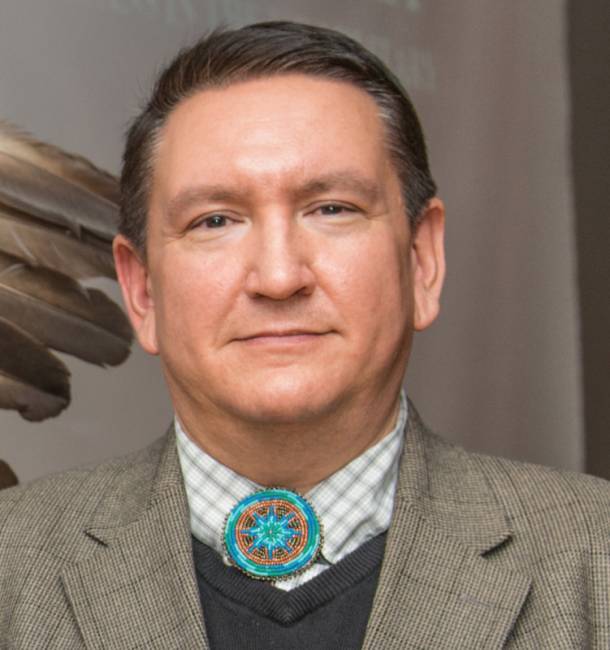You have /5 articles left.
Sign up for a free account or log in.

John Norder
Michigan State University
Michigan State University pledged to create a “safer, more secure and more supportive” campus in the wake of the Larry Nassar sex abuse case. A new lawsuit says that’s just rhetoric and that the university is still protecting predators rather than victims.
The plaintiff in this new case, Christie Poitra, says she suffered years of daily sexual harassment from her supervisor John Norder, associate professor of anthropology and former director of MSU’s Native American Institute, when she worked as the institute's assistant director. And when she finally reported Norder, she says she faced retaliation in the form of institute budget cuts and low pay. Poitra says the fact that she’s an Indigenous woman, Latina and disabled contributed to this treatment.
The university’s case against Norder took over 500 days, start to finish, despite an MSU sexual misconduct policy describing a 60- to 120-day timeline for complaint resolutions. Norder also allegedly broke a no-contact directive during the investigation, leading Poitra to request and be granted a restraining order from a Michigan judge.
In the end, Norder, who was on paid leave during the investigation, was suspended without pay for 20 working days and blocked from administrative positions for five years. He's now back at work.
As for Poitra, she says the case caused her such extreme stress that it began to affect her health, prompting a visit to the emergency room for chest pain. She’s been on medical leave since November.
“Norder’s punishment was four weeks’ suspension without pay,” served in two-week chunks prior to and following last summer, Poitra said. “In my opinion, his behavior was a fireable offense according to the policies outlined in MSU Faculty Handbook. And at the end of the Title IX investigation, the MSU administration allowed him to return to teaching. He currently works with students.”
Poitra remains the interim director of the institute, which she has managed since Norder’s departure during the investigation, and an affiliate faculty member. She's an expert in K-12 Indigenous policy and practice.
Neither Norder nor his lawyer responded to a request for comment. MSU declined comment, citing the pending legal case.
Some ‘Friendship’
According to Poitra’s lawsuit and multiple other documents related to her case, Norder fostered what he called a “friendship” with Poitra after she started working at the institute in 2016. He insisted on taking Poitra out for lunch, drinks and sometimes-expensive dinners, leading Poitra to believe that she was indebted to him for these pricey outings—even though she felt like she had little choice but to attend, since he was her boss. He also allegedly asked Poitra about going to the movies with him (she says she said it would be inappropriate) and asked Poitra not to tell his wife about time they spent together.
Slowly but surely, Poitra says, Norder pushed the boundaries of their relationship past anything resembling a professional relationship, asking her about her sex life and talking about his own. He also allegedly viewed bondage pornography on his work computer and listened in on his wife at home without her knowledge via an Amazon Alexa device, forcing Poitra to listen. Poitra says she was too scared to say anything much of the time because it was still early in her career and Norder had boasted about previously getting rid of other female subordinates with whom he'd clashed.
“Norder wielded great power over me,” Poitra wrote in a response to the university’s investigation based on Title IX, the federal law against gender-based discrimination in education. “In addition to being my supervisor, he is a senior tenured faculty member in a small academic community where everyone knows everyone. I am a fix-term specialist on a year-to-year contract without union representation, which makes me vulnerable. My academic expertise in Native American communities also limits the types of jobs I am qualified.”
Despite these concerns, by 2017, Poitra says she was continually attempting to set boundaries with Norder. She says she went behind Norder’s back at restaurants to split the check so he couldn’t insist on paying, stopped having drinks with him and scheduled meetings for immediately after or during lunch as to limit how long they could spend together on breaks.
Poitra says she became afraid that Norder would install a listening device in their work office, and that she pushed back on his suggestion that they install something like an Alexa device there. Norder also allegedly said he watched his wife use a campus pool facility via construction camera and told Poitra she should visit the pool, as well.
Norder routinely talked about his bowel movements, and only became more graphic when she asked him to stop, Poitra says. He also allegedly talked about sex during long drives to professional meetings or other isolated settings, telling Poitra about how he liked to tie his partner up. She says he tried to invite himself over to Poitra’s house after one long drive, which she avoided by introducing Norder to her spouse.
Poitra says she was diagnosed with temporomandibular joint disorder due to stress in 2017. Previously, she’d been diagnosed with related post-traumatic stress disorder stemming from a 2013 car accident (she was a graduate student visiting a reservation school at the time). Norder knew about the PTSD as her supervisor, but instead of keeping the information confidential, he allegedly told several people and suggested that Poitra had a “Xanax problem.” (Poitra is prescribed medication for travel for her symptoms.) Norder also allegedly sent Poitra text messages about plane or car crashes or boats sinking prior to her travel to professional events.
In one instance, when the two were traveling together in a car,, Norder was allegedly reading from his phone while driving and drifted across lanes as Poitra objected. After a second, similar incident, she says, she never rode in a car with Norder again.
‘Breaking Point’
By 2018, Norder had sent a photo of himself in the shower to Poitra, she says. He also allegedly went through her desk drawers, found a lip ointment and asked her if she had genital herpes. Poitra said her “breaking point” came in July of that year, when Norder allegedly asked her how she’d lost her virginity and then stepped very close to her, purportedly to open the office blinds, and told her about his first sexual experience. The incident made Poitra feel so “unsafe” that she went home and cried to her spouse, she says.
MSU received a third-party report alleging misconduct by Norder in August 2018, according to the lawsuit, and Poitra reported her experiences with Norder since 2016 to university investigators soon after.
Norder was directed to work from home and not contact institute staff during the inquiry. He was put on formal, paid administrative lead about a month after the initial report. Despite the no-contact directive, he allegedly called, emailed and texted Poitra, and even showed up at the center in person. Poitra says she remained concerned that he’d enter the office to install remote monitoring equipment. She says she also unsuccessfully asked for help cleaning out Norder’s desk, and that she had to remove tubes of sexual lubricant from it herself.
MSU issued an initial report on the case in early 2019, but Poitra said it was missing key information and included errors. In mid-2019, about a year after the initial complaint, MSU told Poitra her case was eligible for a hearing.
According to a 2019 MSU security incident report, IT investigators found on Norder’s work computer 1,000 sexually explicit image and video files (some of which were of Norder himself), evidence of explicit file deletion, and web browser bookmarks for at at least six sexually explicit or “hookup” websites. Regarding Poitra’s concerns about voyeurism, the university also found evidence that Norder (or someone else) had used remote-access software for three outbound remote sessions and one inbound session.
A Michigan judge granted Poitra’s request for a personal protection order from stalking by Norder in late 2019, after she reported Norder for contacting her through social media during the ongoing university investigation. The order was later extended.
Around the same time, according to university documents, Norder filed a report with the university saying that he had been harassed on the basis of national origin and sexual orientation. He later decided against moving forward with an investigation, but the university ordered a no-contact directive against Poitra regarding Norder anyhow. A university staff member even allegedly contacted Poitra to discuss “behavioral guidelines” for professional events where both Norder and Poitra might be in attendance.
The university hearing didn’t take place until early 2020, during which Poitra says Norder’s lawyer grilled her as to whether Norder’s comments were really sexual in nature.
A few weeks after the hearing, with no finding yet announced, Poitra and her lawyer asked the university's Board of Trustees for help with the case, which had been open for 544 days already. Three days later, Poitra was informed that Norder had been found responsible for violating the university’s sexual misconduct and relationship violence policy. Regarding Norder’s alleged comments about Poitra’s disability and her weight, he was found not responsible for violating the university’s antidiscrimination policy.
In April 2020, MSU notified Poitra that Norder would be suspended without pay for four weeks and ineligible for administrative positions for a period of five years. MSU also set a permanent no-contact order between Norder and Poitra and required Norder to attend training regarding the university’s sexual misconduct and relationship violence policy.
New Problems
Poitra was formally appointed the institute’s interim director about a year after filing her complaint, even though she’d already been effectively serving in that role since Norder’s suspension. She didn’t get a pay increase until about six months after the formal appointment, after asking for it “countless” times, according to the lawsuit. Even then, she says was paid about $30,000 less than Norder had been paid, with no start-up funds. She says she asked to negotiate and was told that there was no room to do so.
Information from MSU complied by Poitra shows she was the lowest-paid institute or center director in 2020 and the only one paid less than $100,000 annually, at about $81,000.
No search for a permanent center director has been initiated, according to the complaint, even though Poitra says she was told by her superiors that she should apply for the role when the time came. Poitra says that unlike the institute’s previous directors, all of whom were male, she’s only had access to a support staff of one part-time employee, and that the institute’s budget has been slashed since 2019. Poitra says she’s effectively doing the work of three full-time employees. Also unlike her predecessors, she says she’s been excluded from weekly meetings for other chairs and directors.
According to the complaint, Poitra’s requests for more support have been met with flat-out refusals or questions about whether the institute even belonged in the College of Agriculture and Natural Resources and needed to be restructured. Poitra says she took these latter questions as a threat to the future of the institute as a whole.
Poitra also says she was baffled when the university suddenly appeared to backtrack on support and appointed someone with little relevant experience and no Indigenous background to the institute last year, at a slightly higher salary than Poitra. Poitra says she later found out that the candidate was a spousal hire who had made a sexual harassment complaint against a colleague in another department, and that when Poitra objected to this arrangement, the university responded by moving the appointee to a third department. The center now has a new administrative assistant, the complaint says, but that employee has no experience working with Native communities—and earns $7,000 more annually than Poitra.
As of August, the institute was moved out of agriculture and into the provost’s Office of University Outreach and Engagement. Poitra says she’s since been offered $105,000 per year, but she would have remained the second-lowest-paid institute director on campus, where center director pay averages $172,000. This new arrangement would come with a catch, however: Poitra says she was told to hire a less experienced administrative assistant, who would accept a salary of about half of what the current administrator is making. Poitra declined the offer.
Despite the challenges, Poitra says that in her first two years as interim director, she brought in more than $1 million in federal grants, published several articles, ran various programs, maintained and developed relationships with Indigenous communities, and increased the profile of the institute on campus and nationally.
Last month, MSU’s Academic Specialist Advisory Committee sent the university president and provost a letter expressing support for Poitra, whose “formal complaints against her superiors at [MSU] are not dissimilar from others across campus.” The committee called on the university to “respond to complaints of harassment in a timely and appropriate manner,” and to study compensation patterns for academic specialists, with a “specific lens focused on inequitable practices towards underrepresented and marginalized groups.” In addition to salary minimums for specialists, the committee suggested “appropriate similar pay for specialists who do the same work, if not the same exact position, as faculty.”
Poitra said that her experience shows the university’s “has not changed since Nassar. MSU continues to be willfully negligent about implementing policies and processes that ensure timeliness, clarity, accountability, safety and equity for their employees.” The lawsuit names four other MSU professors allegedly found to have violated MSU’s sexual harassment policy who remain employed.
Poitra is alleging that MSU was “deliberately indifferent” to sex-based discrimination, in violation of Title IX, among other counts. She says her lawsuit “is a product of hollow policies, retaliation from weak leadership, and a Title IX process designed to abuse survivors into not pursuing justice.”





